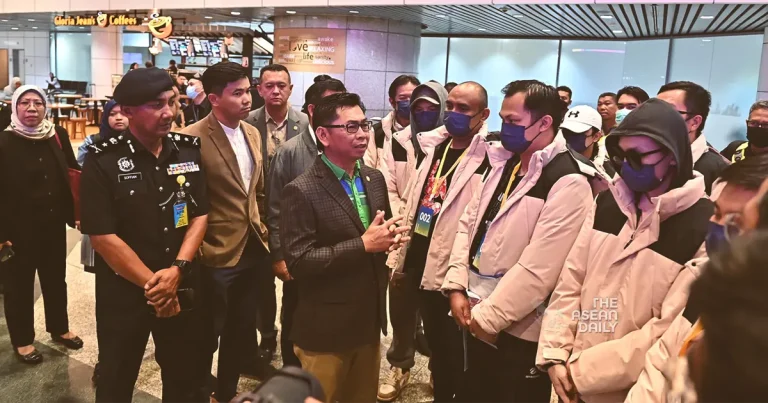1-12-2023 (KUALA LUMPUR) In a harrowing ordeal, 121 Malaysian citizens, predominantly of Chinese descent and ranging from their 20s to their 50s, stranded in Laukkaing, a town on the China border in northern Myanmar, have finally returned to Kuala Lumpur. The special flight from China’s Kunming marked the end of their months-long ordeal, during which they were trapped in compounds, coerced into committing cyber fraud.
The victims were ensnared in Laukkaing as the town became a focal point of conflict between ethnic armed groups and Myanmar’s junta. The Brotherhood Alliance, a coalition of armed groups, launched a surprise assault in October, forcing the junta into a retreat across northern Shan State.
A primary objective of the operation was to shut down the scam compounds that had generated billions of dollars from Myanmar’s remote frontier. The funds were often diverted to junta affiliates who had, until recently, operated in the border zone with impunity.
As the crackdown on scam operations intensified, individuals from various nationalities, including Malaysians, Thais, and Vietnamese, were gathered from across Shan State to be evacuated via the China border. However, Laukkaing has been gripped by fighting for over a week, with regular rocket strikes adding urgency to the evacuation efforts.
Malaysia’s Deputy Foreign Minister, Mohamad Alamin, personally greeted the returnees at Kuala Lumpur International Airport. He assured that the government was actively working to repatriate the remaining seven Malaysians still stranded in the conflict zone, citing various challenges.
The seven individuals faced obstacles such as being located over 1,000km away from the Chinese border, being barred from entering China due to a past criminal record, or choosing to remain in Myanmar. Mohamad emphasized that the government would stay updated on the situation and conduct further evacuations as needed.
Upon their return, the police will record statements from some of the 121 individuals and initiate legal processes. Malaysians of Chinese descent are particularly targeted by fraudsters for their language skills, and many have been lured into working in scam centers.
The evacuation process was the outcome of a meeting between Deputy Prime Minister Fadhilah Yusof and China’s two vice-premiers, Liu Guozhong and Ding Xuexiang, during an official visit to China on November 16. The Malaysian embassy in Yangon had also sent at least 10 diplomatic notes to the Myanmar government, seeking assistance in rescuing Malaysians from the conflict zone.
Despite these challenges, the billion-dollar scam rooms in Asia are unlikely to close permanently. Security experts predict they will either relocate or adapt by leveraging technology to reduce the workforce. The lure of easy money continues to drive individuals into falling victim to job scams across various countries in the region.
Marina Ibrahim, a lawmaker in the Johor state assembly, shared her experiences advising constituents to avoid falling prey to job scams, emphasizing the importance of exercising caution when responding to enticing job offers.
The return of the Malaysians has brought relief to families, with one anonymous parent urging youngsters to consult with their parents before accepting seemingly lucrative job offers, cautioning against offers that appear “too good to be true.”




